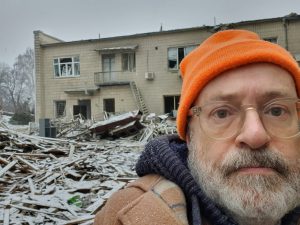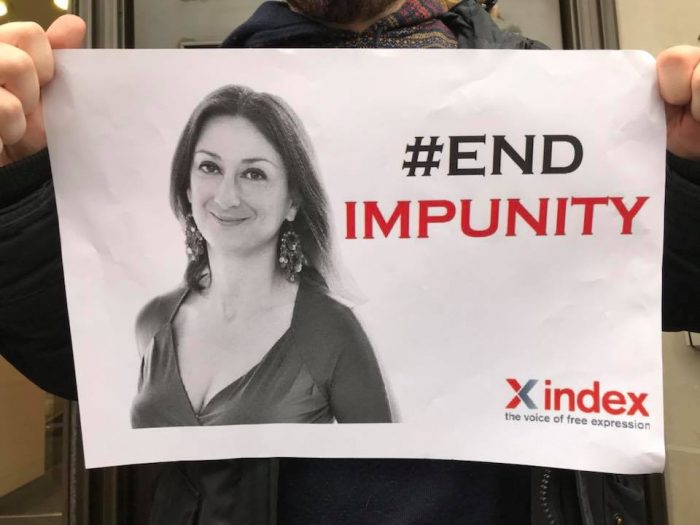2 Mar 2022 | News and features, Russia, Ukraine

John Sweeney reporting from Ukraine for Index
Rost used to be a hot air balloon pilot before the war but now he’s a grim figure in dark hoodie, carrying a rifle, his face knotted with pressure because he is guarding Kyiv’s TV tower from Russian attack. But there is only so much that the Ukrainians can do and the previous night, Tuesday 2 March, at 1800 hours four Russian missiles punched through, hitting the tower’s control building by its base and knocking Ukrainian TV off the airwaves. The moment curfew lifted at 0800 hours Wednesday morning, I thumbed a lift to the TV tower and was the first reporter inside the complex. The more Rost showed me, the darker it got.
The tower itself disappeared into the early morning fog, not obviously touched but the control building near-by had taken a direct hit. Windows were smashed to smithereens, frames hanging loose, rubble crunching underfoot. Rost explained what had happened in Russian, a language I studied at school and then forgot. I filmed what he said and put it up on Twitter and someone translated: “The rockets flew in….they were laser-guided, they have good equipment, they came towards the building, four rockets came this way, naturally the people died here because of the explosions and I’m showing the gentleman from Britain, losses are serious, the building is ruined.”
He took me round the front of the control building and he stooped to give me a present, an evil butterfly wing of shrapnel, fired from Russia without love. On the ground was a puddle of blood one metre wide, still brightly red in the cold, snow still on the ground. A worker had been killed in the blast, his corpse removed but no-one had yet got around to washing away the blood.
That was the easy bit. We went out of a guardhouse and across a wide street, stepping over electricity cables that had fallen onto the tarmac, to the far side where there was a row of shops, some burnt out, still smoking from the attack the previous evening. On the ground was the corpse of an elderly man and, closer to the shops, the bodies of a mother and child. Ambulance workers or perhaps people from the morgue had come and were placing blankets over the dead before putting them in a dark green van for their last long journey through Kyiv.
The Russian state is saying that it is not killing civilians. That is a lie. I saw evidence of that with my own eyes this morning.
Censorship has many forms but knocking a TV station off air by firing missiles at the transmitting tower is perhaps as subtle as Vladimir Putin gets these days. Less brutal but perhaps more effective in shoring up his grip in power is switching off the last two independent media stations in Moscow, Ekho Moskvy and TV Rain. The last brave reporters with some licence to hit the airwaves have been silenced.
Moscow is fast becoming the new Pyongyang, one of the airports still open to Russian air traffic. Putin’s war is a thing of evil but it’s possible to see that he had made a miscalculation, that he has hopelessly misread the courage of ordinary, extraordinary Ukrainians from their comic turned President down to the florists now making Molotov cocktails, that the West – for once – has got its act together, that the old man in the White House has far more fight in him than the Kremlin could possibly have imagined.
So switching off sources of information, rough and ready though they may be, will become crucial as things get darker for Putin’s regime. Here in Kyiv, that is not an academic question. If the Russians do arrive here in force, then any Ukrainian journalist with a strong voice will be in trouble. Foreign journalists with big media houses at their back – CNN, ABC, Reuters – will have some protection. As a freelance, for the moment, I have my orange beanie hat. Still, telling truth to the Kremlin is a necessity in the twenty first century and it’s only just become fashionable.
The truth is that Vladimir Putin’s military machine is killing civilians in a country at peace until he invaded it. And however much the censor’s pen and switch and missiles command silence, the truth must be told.
17 Feb 2020 | News and features, Uncategorized
[vc_row][vc_column][vc_column_text] [/vc_column_text][/vc_column][/vc_row][vc_row][vc_column][vc_column_text]Index on Censorship is carrying out a year-long research project that seeks to identify the scale and nature of a current phenomenon – vexatious legal threats and actions against journalists in Europe.
[/vc_column_text][/vc_column][/vc_row][vc_row][vc_column][vc_column_text]Index on Censorship is carrying out a year-long research project that seeks to identify the scale and nature of a current phenomenon – vexatious legal threats and actions against journalists in Europe.
Vexatious actions, which may include letters threatening libel and defamation, come from private parties (often corporations or wealthy individuals) with the intent to silence journalists and media outlets and prevent them from investigating or publishing their work.
As part of this project, we are asking journalists and media outlets from the EU, UK and Norway, who might be able to provide insight into how common this phenomenon is, to fill out a questionnaire, which can be downloaded and filled out securely here.
As well as interviewing journalists, the project includes roundtables and reports on the extent to which journalists’ work is impeded by vexatious actions.
Please return the questionnaire to [email protected][/vc_column_text][/vc_column][/vc_row]
31 Jan 2012 | Middle East and North Africa
Last week, Bahrain’s Information Affairs Authority wrote to Index, to address our criticisms of media censorship in Bahrain. Let’s go through their clarifications:
Bahrain continues to work closely with the media and to provide them with greater accessibility to cover events in country. This is reflected through the extensive on-ground coverage during the release of the Bahrain Independent Commission of Inquiry (“BICI”) report from internationally renowned media outlets including BBC, CNN, Al-Jazeera English and Arabic, Al-Arabiya, and many others in November, which was at the same time that the Index of Censorship (IoC) team was in Bahrain.
It is true that the Bahraini government allowed the international media and rights organisations into the country during the week of the BICI report. But coverage during that week does not necessarily indicate “extensive on-ground coverage”. The country initially allowed journalists to enter the country following the release of the BICI report, including the New York Times’s Nicholas Kristof, who has been openly critical of Bahrain in the past. However, the transparency promised to the international rights community seemed to only be available for a limited period of time, as employees from three international rights organisations were barred from entering the country this month.
The Information Affairs Authority further demonstrated its commitment to “extensive on-ground coverage” by allowing 700 international journalists to attend the Bahrain International Air Show. Indeed, journalists from publications like Business Intelligence Middle East and Trade Arabia covered the show, which took place from 19-21 January. The air show was Bahrain’s first major international event since the start of unrest in February and March of last year, and protesters attempted to disrupt the show, designed to bring back investors to Bahrain — but the backdrop of social unrest was most likely no competition for journalists commissioned to write about the parade of planes, rather than police brutality on the ground.
The letter then goes on to inform us that Bahrain has been implementing the recommendations of the BICI report “publicly and transparently,” and that the implementation can be tracked online. My views on starting a committee to look into implementing the recommendations of a committee can be found here.
The letter ends by looking at Bahrain’s commitment to media openness. The BICI report made the following recommendation related to the media:
1724 (a) – To consider relaxing censorship and allowing the opposition greater access to television broadcasts, radio broadcasts and print media. The continuing failure to provide opposition groups with an adequate voice in the national media risks further polarising the political and ethnic divide.
The Information Affairs Authority then boasts that they have brought in media consultancy IMCA to improve Bahrain’s media based on the BICI’s recommendations, and bring it “up to international standards.” Sounds great — but like many of the plans for change, information on actual plans for implementation are sparse.
Full text of the letter:
15 Jul 2011 | Index Index, minipost, News and features
Saodat Omonova, one of two women journalists protesting media censorship in Uzbekistan, has ended her hunger strike after being hospitalised earlier this week. It had been 16 days since Omonova and colleague, Malohat Eshonqulova, had begun their hunger strike after they were arrested and fined for protesting outside the presidential palace. The pair were were fired from state television channel Yoshlar last December, three days after they staged protests against media censorship. They are still fighting a court battle to appeal their initial dismissal.


 [/vc_column_text][/vc_column][/vc_row][vc_row][vc_column][vc_column_text]Index on Censorship is carrying out a year-long research project that seeks to identify the scale and nature of a current phenomenon – vexatious legal threats and actions against journalists in Europe.
[/vc_column_text][/vc_column][/vc_row][vc_row][vc_column][vc_column_text]Index on Censorship is carrying out a year-long research project that seeks to identify the scale and nature of a current phenomenon – vexatious legal threats and actions against journalists in Europe.